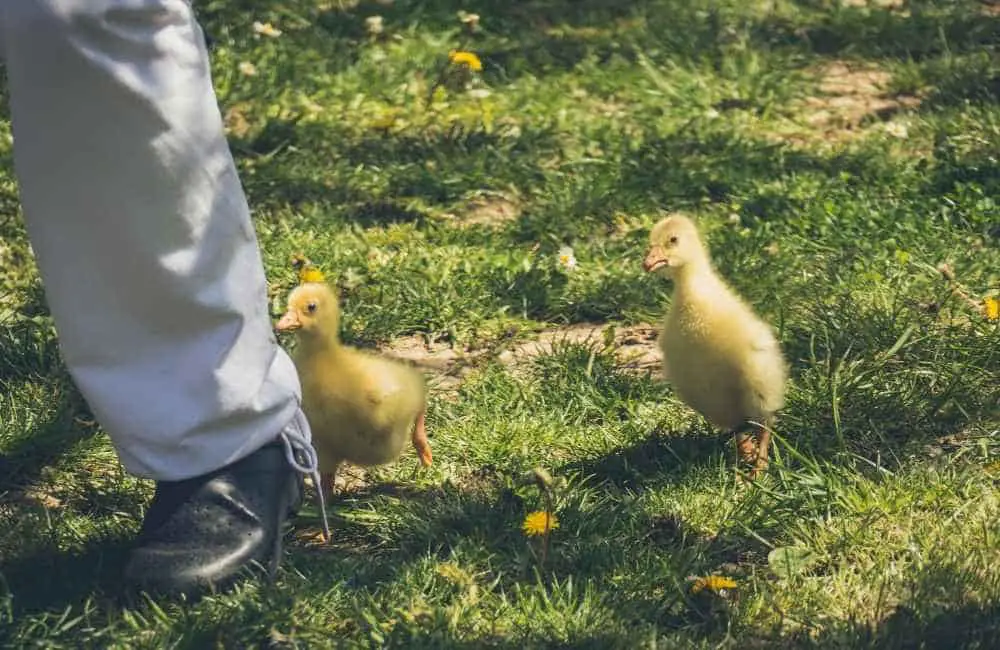You’ve no doubt seen it before: a long line of ducklings waddling behind their mother dutifully. Even in the face of oncoming traffic, baby ducks will continually follow their mothers their entire lives, without an ounce of doubt in their minds. I know, it’s adorable!!! Who doesn’t love ducks? Besides being super cute, they’re also pretty smart — science proves it!
Not unlike many other species of birds, ducklings are able to distinguish their own mother and siblings based on sight. Once that initial bond has been made from an early age, ducks won’t follow anything or anyone else. And it is this ability that reduces a duck’s chance of getting into danger. They’re not going to end up accidentally tottering after a fox or into the mouth of a dog.
But what about if you have a pet duck? If you’ve raised it from birth, and now he’s following you around all the time? Is that the same thing? Let’s find out!
It’s Called Duck Imprinting
Duck imprinting is essentially a process by which attachment develops between a newborn duck and its mother. And by mother, I mean either human or duck mother. The process works the same for both.
As soon as they are hatched, baby ducks immediately start walking and in doing so, follow their mothers almost instantly.
Let me explain it a little more extensively so you can understand the whole process and how it works a little better.
What is Duck Imprinting?
In the first few days of life, known as the “sensitive period,” young ducks (and many other species of birds) undergo a phenomenon called imprinting. During this period, images of the baby duck’s mother and its family act like a stamp on the brain, leaving an ingrained impression in the brain that guides the duckling on who to follow and evidently trust. Outside of this period, the bond will not form. In other words, a newly hatched duckling who isn’t instantly exposed to a mother, whether duck or human, won’t form a connection with anyone and no bond will be initiated.
This is very rare, as the mother is usually the first thing a duckling sees. However, when a duck is separated from their mother directly from birth, it’s highly likely that he’ll grow up following the first person who moves around him during the time. If that’s you, it’s you he’ll be following around!
This imprinting behavior was deeply studied by Konrad Lorenz, an Austrian biologist whose work investigating imprinting in geese earned him the Nobel Prize in 1973. He learned that young goslings wouldn’t only follow him around. They’d also follow virtually any noticeable moving objects including red balls or blocks. This finding led to his conclusion that ducklings rely primarily on sight to imprint and follow someone or something around.
Recent Findings on Imprinting
From the 1980s onwards, research has found that imprinting is far more common than Lorenz ever expected. For instance, research performed on baby chicks indicates that the richness of a young bird’s environment can greatly impact the strength of the imprint.
As an example, classical music is proven to enhance the strength of a duck’s imprinting. Further research has found that imprinting isn’t just visual. Baby ducks can imprint on sounds, and even generalize from an imprinted object to follow similar objects. This research thereby proves that young birds can indeed generalize.
On that note, baby ducks are far more complex than we ever could imagine. Research carried out by scientists Antone Martinho III and Alex Kacelnikand found that ducklings are intelligent enough to understand the concepts of “same” and “different.”
While it was initially believed that ducks could only rely on visual details like color and shape to follow a target, it has now been proven that ducklings can comprehend abstract relationships between different objects.
This was groundbreaking research, as prior to that, this ability for abstract thought was only demonstrated in primates after intense training. Now we know ducks have the same profound ability.
So this is Why Your Duck is Following You…
Were you the first thing your baby duckling saw as it hatched and began walking? If you raised a duck from birth or simply found yourself in a situation in which a freshly hatched duckling laid eyes on you, imprinting is the reason your duck is following you.
That’s because ducklings follow the first moving object they see after hatching. While it’s more likely to follow something that makes duck sounds, it’s not uncommon for ducks raised by humans to follow the first person he sees and hears. Once that attachment forms, he’ll follow you around for life.
Because imprinting is so strong in ducks, having a duck imprint on a person ensures it loves you for life. If you want a duck to live with its own kind, make sure you avoid having its imprint on a human.
If you want a duck to grow up loving you and following you everywhere, it’s worth considering a few things before making that final decision. You’ll need to know whether you’re truly prepared to take on that role and responsibility.
What to Consider Before Imprinting on a Duckling?
Here are a few things to bear in mind before imprinting on a duck. Sure, I know the idea of having a baby duck following you around like its mom sounds super cute and adorable. But if you’re not prepared and you don’t have the resources to do it, you could end up severely damaging a duck’s life. Let me point out a few things to remember and consider before imprinting on a duck.
Resources
Imprinting does not come cheap. Once a baby duck considers a human as its mother, you need to remember that that duckling will grow up as an adult duck with needs. Those needs may include veterinary care, diapers, companionship, and a safe home (free from predators!). Do you have the resources to keep him safe, healthy, and happy? That’s the question you need to ask yourself before imprinting on a baby duck. Because his life depends on it…
Protection
Ducks are vulnerable to a host of predators. As his sole guardian, it’s your responsibility to keep him safe and as far away from predators as possible. For starters, you wouldn’t be able to house a duck with a dog or cat. If you have a cat or dog, don’t even think about bringing a duck into the family. They could certainly pose a danger to your duck. Take an honest look at your current situation and ask yourself, is my home safe for a duck? And it’s not just protection from predators that matters. You’ll also have to make sure he’s protected from potential diseases.
Time
One thing you need to remember is you’ll be the mother duck to your duckling. Ducks are loving, sensitive creatures that need a lot of care and attention. You’ll be required to do most of the duties his mom would have done, such as playing with your duckling, showing him love and care, eating next to him, and even sleeping next to him. This initial close bonding lasts around seven months. Nevertheless, even years down the line, you’ll still be required to take care of your duck and prioritize his well being. It’s no different to having any other pet.
Permission
Before imprinting on a duckling, make sure you have your landlords, parents, or even law’s permission to keep ducks on your property. You’ll definitely want to have everything mapped out before getting a pet duck.
Knowledge
Of course, another thing you’ll absolutely need is knowledge on ducks. Avoid getting a duck if you know nothing about them and aren’t prepared to learn. They’re still wild animals that come with different requirements to a domestic pet like cats and dogs.
For starters, you’ll need to know what ducks eat. To keep them healthy and thriving, be sure you’re providing adequate nutrition. You should also know that ducks need a lot of attention and interaction. Don’t leave them for hours to go to work or anywhere for that matter. Pet ducks are best for freelancers who work from home.
Commitment
You know the old saying, “a pet is for life?” Well, that’s definitely true and well worth listening to. There are many people out there who get a pet simply out of boredom and then they end up growing bored of the pet when they’re no longer their cute, baby selves. You need to remember that a pet isn’t there for a few months or even a few years. If you don’t think you have what it takes to commit to a pet, don’t have one at all.
While ducks make wonderful pets, you should also know that they poop a lot and they can’t control it. They’ll also follow you everywhere after imprinting. If you’re okay with all that, maybe you’d be a good duck owner. If that all sounds like too much work, stick to visiting ducks at the nearby park.
Another Reason Ducks Are Following You
While the most common explanation for ducks following you is imprinting, it could be something far simpler. Know how your dog or cat follows you around when you’ve given them one or two treats? Your duck has a similar tactic.
If you’re the feeder of ducks, they may follow you around looking for more tasty treats. It’s not clearly understood why they do this, but I believe it’s probably the same reason your cat or dog does it. They like treats! And hey, who doesn’t?
So if you’re noticing ducks following you after feeding, it’s because they connect you with food and goodies. They’re not shy about following you around for more.
If you want it to stop, find another feeder, or try distancing yourself from the duck. Alternatively, enlist someone else to do the feeding.
What to Do if a Duck Follows You and You Aren’t His Owner?
If a baby duck is following you and you aren’t his owner, the first thing you should do is keep the bird somewhere calm, comfortable, and warm, and take him to your nearest wildlife rehabilitation center as soon as you can.
In the meantime, avoid handling the duckling too much and keep potential predators like dogs, cats, and larger birds well away. To keep them wild, minimize human contact as much as possible. Once ducks are too humanized, it will be hard to integrate them back into the wild with their own species.
If you are unsure about anything, call your local wildlife rehabilitation center so they can come out and take the little guy. This ensures you have minimum interaction with the duck. And this gives him a much better chance of survival.

